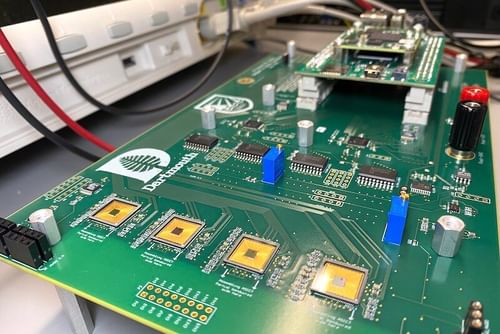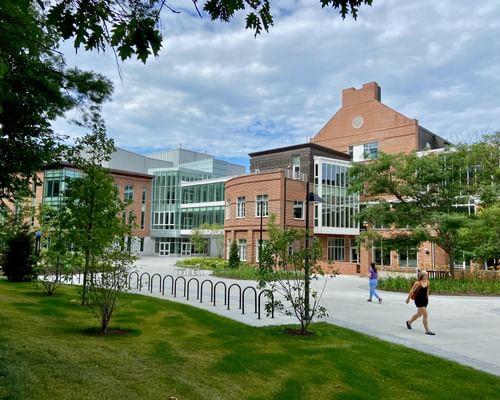On This Page
- Overview
- Areas of Study
- Prerequisites
- On-Campus Courses & Requirements
- Research & Design Electives
- Join Our Next Info Session
- Tuition & Expenses
- Financial Aid
"Thayer is a call for action, an innovative hub, and a place to laugh all in one. And arguably most important, is a place to learn that we will all make a difference in our respective communities."
—Stephanie Emenyonu '16 Th'17 '18
Dartmouth's MEng:
Graduates acquire:
Through the MEng program, graduates acquire a depth of knowledge through courses specific to their specialized engineering track, as well as basic competency in applied mathematics and engineering and a breadth of understanding of various engineering disciplines through electives.
MEng students can tailor their degree to their individual interests with six specialized tracks in:

Biological and chemical engineering exists at the interface of engineering, biological, and chemical sciences. This interdisciplinary field brings to bear fundamental design principles to both elucidate and modulate the function of biological systems, ranging in scale from molecular to cellular to whole organisms.
On-Campus Biological/Chemical
Biomedical engineering is the broad area of study in which engineers use an interdisciplinary approach to solve problems in the medical field, often associated with the interaction between living and non-living systems. The program is intended for engineers who want to add depth to their knowledge or acquire new specialized knowledge in biomedical engineering.
On-Campus Biomedical
Electrical and computer engineering leverages the fundamental principles surrounding electricity to advance today’s emerging technologies ranging from semiconductor devices to advanced communication networks, from self-powered sensors to electric cars, from wearable devices to cognitive medical imaging, and from autonomous vehicles to smart cities.

Energy is a major determinant of world events and quality of life. Energy engineering brings to bear the spectrum of engineering disciplines on challenges and opportunities involving energy, recognizing social, political, and economic contexts.
On-Campus Energy
The study of materials science and engineering relates the properties of materials—chemical, electrical, magnetic, mechanical, optical—to their internal architecture or microstructure.

Mechanical, operations, and systems engineering leverages fundamental principles of physics, economics, human behavior and advanced computing to innovate in a wide array of application domains.
On-Campus Mechanical/Operations/SystemsMEng candidates are required to hold a bachelor’s level degree in engineering or a bachelor’s level degree in a scientific field such as physics, chemistry, or computer science from an accredited institution. Admitted students with degrees from non-accredited institutions may be required to take the necessary prerequisite courses, in addition to courses for the MEng, to fulfill the requirements of the degree.
The program consists of nine courses in one of the six MEng areas of study, of which five should be from the list of core courses. The remaining four electives can consist of any graduate-level engineering or science courses at Dartmouth. For students with no engineering background, additional courses may be required. Students who earned the BE at Dartmouth may count up to six graduate courses towards the requirements for both the BE and MEng programs. The courses must not have been taken to fulfill the requirements for the AB.
For a one-course research experience, students can elect ENGG 192: Independent or Group Study in Engineering Sciences. With the exception of ENGM 191: Product Design and Development, which must be elected as part of the MEng Design Project, MEng students may not take ENGM courses for credit.
Faculty advisors aid MEng students in developing their course of study, which is submitted to and approved by Thayer’s Graduate Programs Committee during the student’s first term of residency.
Students may pursue the degree at a pace that best fits their professional schedules. Students enrolled full-time complete the program in three terms (nine months), taking three courses at a time. Part-time students may take one or more courses over additional terms. Dartmouth students pursuing the BE and MEng degrees simultaneously must have at least one term of residency solely as an MEng student. Students must complete the MEng program within six years of initial enrollment.
Students may be allowed to transition to either the MS or PhD degree programs with the approval of the MS-PhD Committee, and at the invitation of a willing faculty sponsor. Students enrolled in either the MS or PhD programs can only transition to the MEng upon request from their faculty advisor.
The MEng program provides unique pathways for students to engage in elective coursework focusing on either research or product design. Students can apply for a one-course research project aligned with Dartmouth Engineering’s ongoing research initiatives, collaborating closely with a faculty mentor. Additionally, for students seeking to delve into product design, elective options are available to gain hands-on experience across the product life cycle, including market research, product development, design research, and prototyping. Reach out to the admissions team for further information.

Learn how Dartmouth Engineering's graduate programs could be a great fit for you. Connect with faculty, staff, and students, and navigate the application process.
The following estimated expenses are for the 2023-2024 academic calendar.
$21,228 per term
Tuition covers instruction and use of instructional facilities.
$22,000–$26,000 per term
Fees and costs include health access/insurance, housing, student activities/services, personal expenses, transportation, books and supplies, etc.
$89,000–$99,000 per academic year
The estimated total cost of a year—including tuition, books, room, board, fees, and incidentals—not including meal plan options.
Need-based financial aid is available to all eligible full-time MEng students (domestic and international). To be considered for financial aid, prospective students must request financial aid while submitting their application.
Those interested in applying for need-based aid will need to complete the CSS Profile form. Please choose the CSS Profile code for Dartmouth College: 3351. The CSS Profile will provide us with a Financial Need Analysis Report to determine need-based aid, which we will use to assess need.
Applicants who are US citizens seeking loans through Dartmouth must also submit a Free Application for Federal Student Aid (FAFSA). For the most up-to-date information for all degree programs please carefully review the information on Thayer Financial Aid.
Need-based, partial tuition scholarships to eligible Master’s students is capped at 40 percent of tuition. Students must submit financial aid materials at the time of application. Late applications for financial aid may be accepted, but awards will be capped at 20 percent based on budget availability.